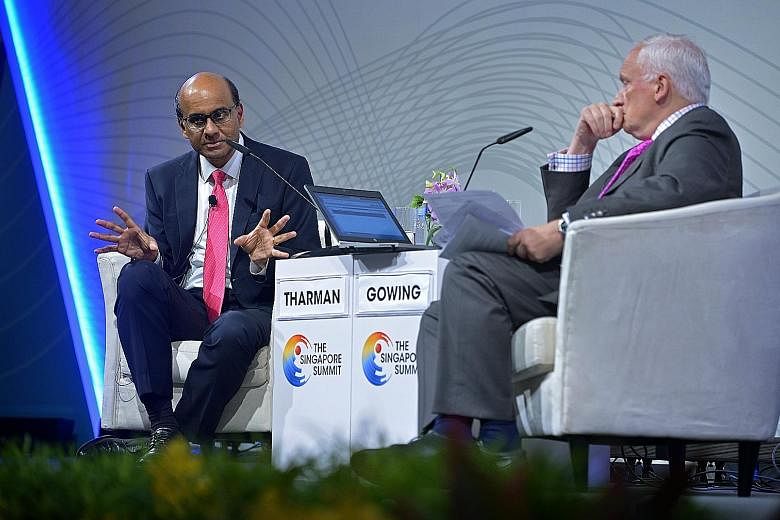Governments and societies have to prepare themselves for major disruptions, whether in the form of terror attacks or technological change, to remain resilient in the aftermath.
Deputy Prime Minister Tharman Shanmugaratnam said yesterday that Singapore has an advantage in this regard - as a small nation, it knows it cannot be complacent.
"We know we have to move, we know we don't have many choices, so when we have an economic challenge, when we have the challenge of terrorism, or whatever challenge it may be, it has to be addressed forthrightly, openly and we have to find a way of moving," he told about 400 global political and business leaders at the Singapore Summit at the Shangri-La Hotel.
This is not easy, he noted in a dialogue with British journalist Nik Gowing. The jobs of governments and educators are more difficult as change is happening far more frequently, he said. This means it is not enough to invest in people for the first 12 to 18 years of their lives, as they will face a lifetime of change.
"We must be able to invest in them throughout life, so they can cope with change and if they get out of the labour market we need to get them back in as quickly as possible - often in a different job or a different sector altogether," he said.
"It requires active government intervention, working with employers, working with training agencies and giving people the sense that they can be optimistic even in a world of technological change."
Closely intertwined with that is a need for the state to give people incentives to take on personal responsibility and effort, he added.
"There's a very important space in public policy… for state activism to support personal effort and responsibility at work, in the way we raise our families, the way we go through education. Anyone who puts in effort deserves some support. And if you do it well it becomes social culture."
He noted a tendency in some circles to say that globalisation and trade are responsible for the parts of the world that have been left behind economically. And such displacement has been blamed for the kind of discontent that, for example, led Britons to vote to leave the European Union. He disagreed, saying it has more to do with domestic policy issues. "People who lost out because of technological change or trade… haven't been helped to get back in the game. That's a domestic policy issue, you can't blame it on trade."
Some countries "have moved from a situation where the job of politics was to enable people to win and enable losers to get back in the game so the pie keeps growing", to one where politics is instead being used to divide people, he said.
Indeed, he believes globalisation still holds much opportunity for emerging economies.
Despite rapid technological advancement, he said emerging economies still have a window of time to get in on the game of manufacturing and international trade, then gradually move up the value chain.
"There is a race against intelligent machines... but I think there is still about five to possibly 10 years, for countries to respond by getting into the game of global value chains. Once you are in the game there is a ladder of opportunity. People tend to move up, one thing leads to another, skills go up and company values go up."


